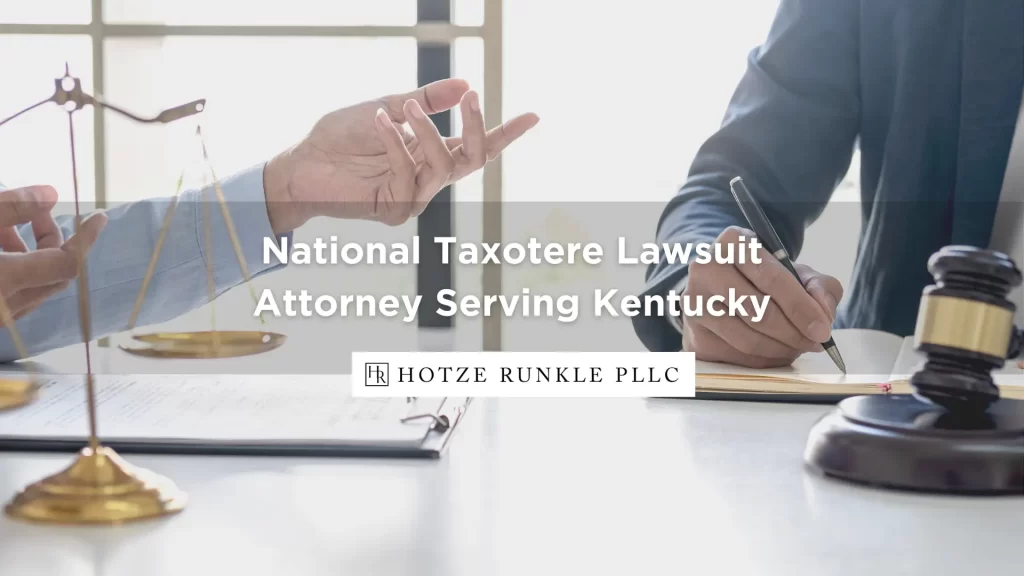
Canalicular Stenosis is an eye condition that occurs when the obstructed canaliculus closes. Long-term inflammation of your canaliculus leads to an infection. If you or a loved one took the drug Taxotere for chemotherapy treatment, take the Case Quiz to find out if you qualify for compensation from the drugmaker. The Kentucky Taxotere Canalicular Stenosis lawyers of Hotze Runkle PLLC will be ready to help you get justice.
What Does Taxotere Do?
Taxotere treats breast cancer by stopping cancer cells from multiplying and becoming abnormal. The drug interacts with cancer cell’s body and causes it to die.
A 68-year-old Japanese woman took Taxotere (also known as docetaxel) every three weeks as a third-line chemotherapy treatment for her breast cancer. She achieved partial recovery. After about 36 weeks, she developed extremely watering eyes and changes to her nails. The results of an eye examination were seemed normal except for the detection of cataracts. Under her eye doctor’s orders, she discontinued treatment with Taxotere because of the adverse side-effects to her eyes. Her eye doctor diagnosed her with Canalicular Stenosis.
Although her excessive tearing improved gradually over two months, the side effects had not resolved completely after she stopped taking Taxotere.
How Do You Take Taxotere?
Trained medical professionals administer Taxotere by an IV (intravenous) and take one hour to complete. Doctors determine your treatment regimen based on the patient’s cancer type, height, and weight. Many patients must take steroids in addition to the IV to prevent fluid retention, which can be severe.
Taking Taxotere is not easy for the patient. The patient risks severe tissue damage if the medication leaks out from the injection site. It can cause burning and painful sensations, even if administered carefully by an experienced nurse.
What Are Other Side Effects of Taxotere?
Taxotere has many side effects, several of them being severe. Thousands of women who had taken the drug were not informed of many of these side effects until in December 2015, when the Federal Drug Administration (FDA) acknowledged that the drug could cause permanent side effects such as Canalicular Stenosis—a serious condition of the eyes. Other serious side effects of the drug include:
- Alopecia: Your hair may become thin, brittle, or possibly fall out. The hair loss is not limited to your head. It may include body hair, underarms, legs, arms, eyelashes, and nose hairs.
- Severe Fluid Retention: Taxotere can cause your body to hold too much fluid, which can cause you not to urinate, experience shortness of breath, unexpected weight gain, or develop swelling.
- Extremely Low Blood Cell Count: Your white blood cells are important for fighting off infections. Taxotere can cause your white blood cell count can drop considerably, placing you at a higher risk of getting an infection.
- Dark, Thinning, Brittle, Or Missing Fingernails or Toenails: This condition onsets gradually after 2-3 weeks of taking the drug.
- Dry Skin or Changes in The Color or Tone Of Your Skin: You may notice changes in your skin after a few weeks of having the dose administered.
- Birth Defects: The drug can cause harm to an unborn child if you are pregnant during your treatment regimen and up to 6 months after you’ve stopped your regimen.
- Secondary Cancer: This side effect is very rare, however, a secondary blood cancer can develop as a result of the Taxotere treatment. Blood cancers include leukemia, lymphoma, and renal cancer
What is Canalicular Stenosis?
Canalicular Stenosis is a serious side effect of Taxotere, which doctors primarily prescribed to women undergoing chemotherapy for breast cancer. It occurs when a part of your eye called the canaliculus. The canaliculus becomes inflamed and eventually infected from the buildup of tears. The side effects can begin as mild progress into a debilitating condition. It starts with constant eye watering than can become debilitating to daily life and can progress into something lasting and permanent. The overflowing of tears is called epiphora. In the initial stage of Canalicular Stenosis, where women only experience epiphora, there are treatment choices. However, if the epiphora continues without treatment, the canaliculus may become infected and permanently damaged.
In cases where the canaliculus becomes infected, the patient may need to have a risky surgery if they do not treat the eye-watering symptoms right away. Risks related to the surgery are:
- Blurred vision
- Excessive bleeding
- Infection
- Irreversible tissue damage
- Persistent migraines
- Scarring
- Sinus problems
- The surgery not working
What Does My Taxotere Injury Mean?
Doctors have prescribed Taxotere to women receiving chemotherapy for breast cancer for nearly 20 years; however, many women have come forward with experiences of serious side effects and are filing lawsuits against the company who manufactured the drug, Sanofi-Aventis, Inc. In their lawsuits, thousands of women stated that the drug label did not include the serious side effects they were experiencing and that the company intentionally hid the information to mislead women into purchasing the drug. In addition, the company claimed that Taxotere was the best drug in the cancer treatment industry but there was no medical proof or clinical trials to support their claim.
The Taxotere lawsuit claims the manufacturer of Taxotere (Sanofi-Aventis) failed to warn patients and physicians of the increased risks of Canalicular Stenosis. Plaintiffs in numerous pending lawsuits have cited to studies showing that Taxotere was no more effective than other chemotherapy drugs that did not have the same side-effect of a substantial risk of Canalicular Stenosis.
The FDA updated its Safety Information page in December 2015 to include the reporting of additional serious side effects. However, women have claimed that Sanofi-Aventis should have warned them about the side effects much earlier and that Canalicular Stenosis was not included in the update.
In March 2016 a woman with breast cancer filed a lawsuit in the U.S. District Court alleging that Sanofi-Aventis had warned doctors and patients in Europe as early as 2005 and Canada in 2012 about the serious side effects from Taxotere, but waited until a month after the FDA’s information update to warn patients in the United States.
So many women filed lawsuits that they met the criteria for multi-district litigation twice, in October 2016 and in 2018. Multi-district litigation allows a judge to preside over similar cases, which makes the judicial process quicker. More than 10,000 Taxotere lawsuits were filed as of April 2019.
Can I Sue Sanofi-Aventis?
Under Kentucky personal injury laws, if you are the victim of medical or professional malpractice by way of negligence or physical wrongdoing, you have up to one year after the incident to file a lawsuit. In your lawsuit, you can request compensation for reimbursement—refund—for any reasonable medical expenses you may have incurred, compensation for any wages you may have lost, payment for any property damage, or compensation for pain and suffering, which be as high as $250,000. In many lawsuits, a personal injury lawyer determines what your lawsuit is worth, and fights for your money in court.
What is Liability?
When a hospital or pharmaceutical company assumes the responsibility of your care or manufactures a drug that your doctor prescribes, they are obligated to ensure your safety, and to protect you from additional and unnecessary harm from within their facility. This means that hospitals are liable for any harm you might sustain. For medical injuries such as harmful side effects to a drug, liability falls into two categories:
Negligence: A medical professional (doctor, nurse, dentist, eye doctor, etc.) is negligent they fail to follow the necessary health and hygiene policies outlined by the Center for Disease Control and Prevention (CDC). Procedures in the CDC’s nationwide health and hygiene policies include hand washing, wearing protective clothing, the sterilization of routine equipment, cross-contamination, sanitation guidelines, etc.
Malpractice: Contrary to negligence, a hospital has committed medical malpractice if a member of its staff makes a medical error causing injury to the patient. Common medical errors include prescribing harmful drugs, not disclosing side effects of a drug, misdiagnosing patients, performing services without the patient’s consent mistakes during invasive procedure, and prescribing patients the wrong medications. States have their own malpractice laws to litigate personal injury cases. In most cases, a court hold the doctor or the pharmaceutical company liable if their conduct fails to meet the “standard of care” provided by other doctors under similar circumstances.
Will I Be Compensated for My Injuries?
 Winning a personal injury lawsuit typically comes in the form of damages, or money, which your lawyer negotiates. When doctors commit medical malpractice or act negligently, the consequence can be enormous for the patient. For this reason, damage awards in medical malpractice and clinical negligence cases are among the highest of all United States personal injury cases. Claims for damages can include:
Winning a personal injury lawsuit typically comes in the form of damages, or money, which your lawyer negotiates. When doctors commit medical malpractice or act negligently, the consequence can be enormous for the patient. For this reason, damage awards in medical malpractice and clinical negligence cases are among the highest of all United States personal injury cases. Claims for damages can include:
- Compensation for partial or complete impairment
- Decreases in earning potential
- Disfigurement
- Emotional distress
- Lost wages
- Medical expenses
- Physical pain
- Punitive damages
Where Can I Find A Lawyer?
Medical manufacturers are ethically and legally responsible for manufacturing safe drugs. The Taxotere canalicular stenosis attorneys of Hotze Runkle PLLC are currently investigating claims for individuals throughout the country who have taken Taxotere. If the chemotherapy drug Taxotere harmed you, then our attorneys may be able to help. Take the Case Quiz to determine whether you qualify to file a lawsuit for you or your loved one.